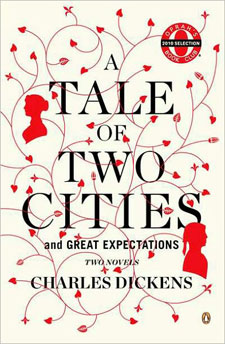I Want to Read Like Common People
 Now, it’s true, I have some issues with Oprah’s Book Club, specifically with the pattern of books Oprah Winfrey’s been picking for it over the last six years, and I even share the opinion of the bookish New Republic writer, Hillary Kelly, that Great Expectations and A Tale of Two Cities is an awkward pair of Dickens novels to read in tandem. (So what would I choose? Nicholas Nickleby and David Copperfield, maybe?) But that’s one of the few things I agree with in Kelly’s profoundly elitist attack on Oprah, the ruination of great literature.
Now, it’s true, I have some issues with Oprah’s Book Club, specifically with the pattern of books Oprah Winfrey’s been picking for it over the last six years, and I even share the opinion of the bookish New Republic writer, Hillary Kelly, that Great Expectations and A Tale of Two Cities is an awkward pair of Dickens novels to read in tandem. (So what would I choose? Nicholas Nickleby and David Copperfield, maybe?) But that’s one of the few things I agree with in Kelly’s profoundly elitist attack on Oprah, the ruination of great literature.
Kelly’s article comes across as one lone note of resentment that Oprah Winfrey, rather than the official gatekeepers of the literary canon, is convincing people to read Dickens and Tolstoy—of course, if Oprah’s making the recommendation rather than, oh, I don’t know, Harold Bloom, it stands to reason that she must be encouraging us to read these books for the wrong reasons. Seriously: Kelly says the Book Club’s selections stem from “a generally wrongheaded view of novels,” one through which “the Book Club has carved its niche among readers by telling them that the novel is a chance to learn more about themselves. It’s not about literature or writing; it’s about looking into a mirror and deciding what type of person you are, and how you can be better.” So, you see, I’m not just invoking Bloom off the top of my head:
“If we read the Western Canon in order to form our social, political, or personal moral values, I firmly believe we will become monsters of selfishness and exploitation. To read in the service of any ideology is not, in my judgment, to read at all. The reception of aesthetic power enables us to learn how to talk to ourselves and how to endure ourselves. The true use of Shakespeare or of Cervantes, of Homer or of Dante, of Chaucer or of Rabelais, is to augment one’s own growing inner self. Reading deeply in the Canon will not make one a better or a worse person, a more useful or more harmful citizen. The mind’s dialogue with itself is not primarily a social reality. All that the Western Canon can bring one is the proper use of one’s own solitude, that solitude whose final form is one’s confrontation with one’s own mortality.”
(And Bloom wrote The Western Canon well before Winfrey had made her first Book Club selection!)
Frankly, I think there’s some room for common ground between “looking into a mirror and deciding what type of person you are, and how you can be better” and “augmenting one’s own growing inner self,” but we can set that discussion aside for now and get back to Kelly’s assertion that the “true classics” of literature are distinguished by “their vast knottiness, glorious language, breathtaking characters, and multi-faceted, mind-twisting prose”—elements of style that will completely befuddle Oprah Winfrey’s audience, because who among those teeming masses could be expected to understand Dickens? You’d think his novels were packets of impenetrable high-Modernist prose, rather than pop fiction that was serialized in magazines and avidly consumed by a mass readership in its day.
Can’t readers just enjoy A Tale of Two Cities as a rousing tale of suspense and romance and intrigue in the heady days of the French Revolution? Enjoy a story for its, you know, story, rather than the “vast knottiness” of its telling? Not according to Kelly: “With no real guidance, readers cannot grow into lovers of the canon.” At best, readers who do not accept the mentorship of the literati are doomed to superficial pleasure; at worst, they will become solipsists, finding themselves (and the best possible versions of themselves, at that) in every fiction. This is nothing more than a variant of the persistent elitism among certain book reviewers that led John Freeman, then the leader of the National Book Critics Circle, to declare three years ago that “books… need to be sifted for the public, to see what matters.” Sifted by the right people, of course.
Mind you, I’m pretty much convinced that Oprah’s Book Club was more interesting in the years before The Corrections, when it was constructing an “alternative canon” of contemporary literature that Winfrey believed spoke meaningfully to the human condition, instead of joining in the rush among today’s book reviewers to declare Jonathan Franzen and Charles Dickens to be equivalently superb. But, again, I’m trying to stay focused on the main topic. Yes, it would be useful, upon reading Dickens for the first time, to have some hand-holding and guidance through the territory—and how awesome would it be if Winfrey decides to bring Peter Ackroyd or Michael Slater, maybe even Simon Callow, onto the show? Useful but not, for the sufficiently motivated reader, essential—and I think Hillary Kelly and The New Republic have a very dim view of American readers and their motivation levels.
15 December 2010 | theory |

 Our Endless and Proper Work is my new book with Belt Publishing about starting (and sticking to) a productive writing practice.
Our Endless and Proper Work is my new book with Belt Publishing about starting (and sticking to) a productive writing practice. 
